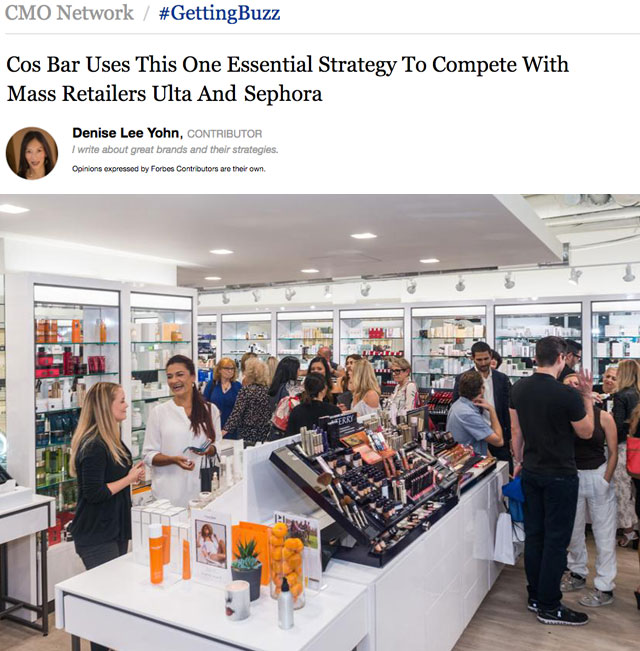PORTFOLIO COMPANY NEWS


When Lily Garfield founded opened the first Cos Bar in Aspen back in 1976, her vision was to be "everything a department store isn't," says CEO David Olsen. Today with department store beauty shopping on the decline and specialty retail players Ulta and Sephora taking over the beauty retail landscape, Cos Bar faces new competition. But it's sticking with the one essential competitive strategy that has established the brand with high-end customers: luxury service.
Cos Bar was started because Garfield had a vision to fill a gap in the beauty retail. Back then, department stores were the only place where you could buy luxury beauty products. But the commissioned salespeople at department stores were notoriously aggressive and focused only on selling the single brand that they represented. Garfield decided to open a store where well-trained employees would provide a level of personal, caring service suitable for the full range of luxury brands they would sell.
Forty years later, Cos Bar has 19 stores in upscale locales such as La Jolla, CA, and Vail, CO. It has earned a reputation as the go-to source for exclusive brands such as Tata Harper and Sisley-Paris among celebrities and high-end clientele who don't blink an eye at dropping $1,000 for cosmetics in a single visit. It also carries more accessible brands such as Bobbi Brown and Estee Lauder, but the shopping experience is definitively luxurious, with stores designed around personal service, not open selling.
Garfield accomplished her goal of positioning Cos Bar as the antithesis of department stores but the company now faces new competition from burgeoning specialty retailers Ulta and Sephora. By carrying a large selection of hair products, skincare, and cosmetics and mastering promotional and loyalty programs, these retailers attract a mass market of consumers who have been fueling their double-digit annual growth. But rather than following the trend and going more mainstream, Cos Bar remains steadfast with its luxury service strategy. Garfield goes so far as to say that a key difference between her brand and Ulta and Sephora is that Cos Bar isn't "prestige," it's "luxury."
In a recent interview, Olsen explained to me that luxury customers are "extremely demanding" and their expectations are "through the roof." So luxury service at Cos Bar is:
· Personalized. "Beauty specialists" (as Cos Bar store employees are called) greet their clientele by name, spend the time to get to know their customers' individual needs and provide caring consultation, and create an atmosphere where there's no hard selling. The personal touch continues after the sale, too, with employees using a "3 x 3 x 3" follow-up approach wherein three days after a customer visits, employees send a personal thank you note; three weeks later they make contact only to build a relationship, not to sell anything; and three months later, they inquire with the customer about replenishing existing products and offer additional ones. What's more, every online order is shipped with a personal note, business card, and offer to help from a beauty specialist.
· Knowledgeable. Cos Bar customers want unbiased advice and full transparency about the products they buy, so employees receive extensive training on the products they sell. From Google hangouts with brand representatives to quarterly in-person trainings added to the minimum of 15-20 years experience Cos Bar employees have, they can present all facets of every product expertly.
· Local And Omnichanel. Cos Bar manages to operate as a local brand and an omnichannel retailer at the same time. Olsen explained that Cos Bar doesn't want to be seen as a chain, so it is "tied into its communities" through special events and hosted parties. It also curates its product assortment by location and features local brands. At the same time, it understands that its customers expect to engage across channels, so it is developing e-commerce capabilities that advance its luxury service strategy including the ability to track in-store purchases online. It also uses social media to develop the personal service link between employee and customer through weekly posts from beauty specialists with their personal recommendations.
Olsen said the company plans to quadruple its sales in 3 years and open 50 stores. Equally ambitious is its aspiration to be "the world's best luxury beauty buying experience." In order to achieve its goals, Cos Bar will have to continue leveraging the one thing Ulta and Sephora can't: luxury service. So far, it seems to be working.
Denise Lee Yohn is a brand-building expert, speaker, and author of What Great Brands Do and Extraordinary Experiences. Contact, follow, friend, or link in with her.